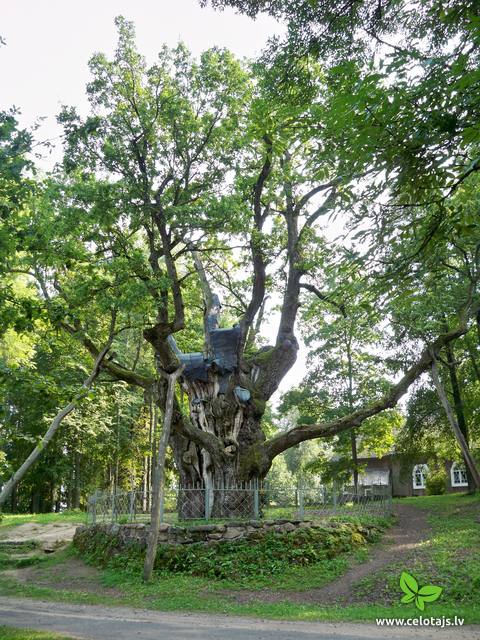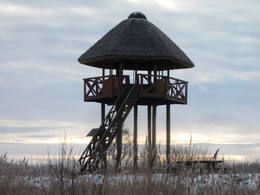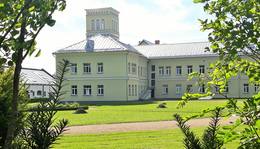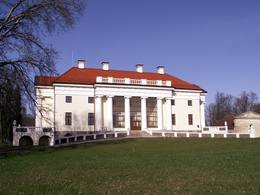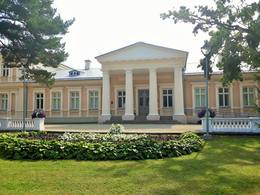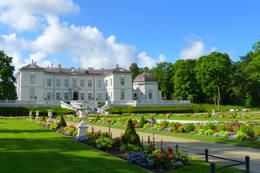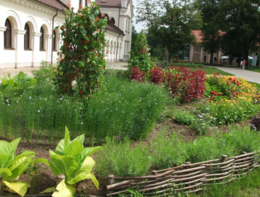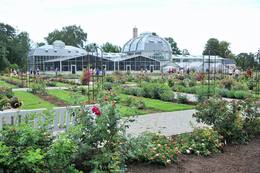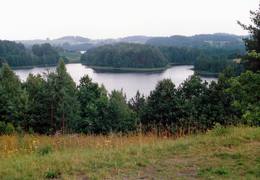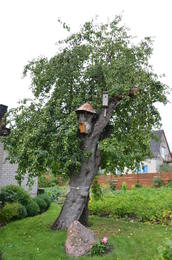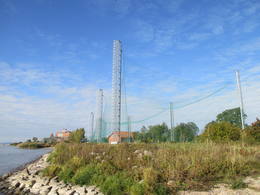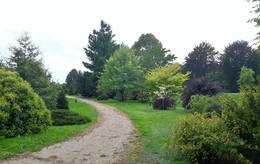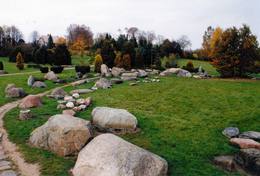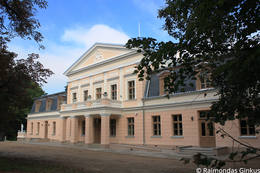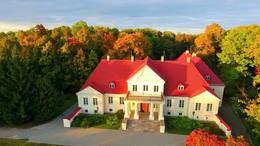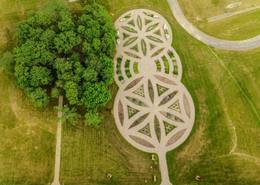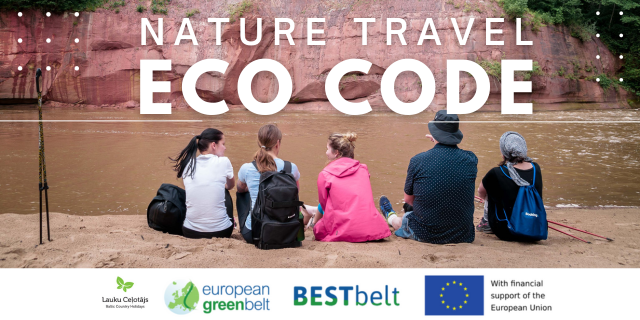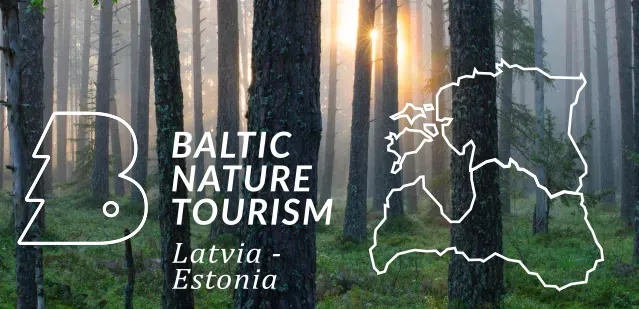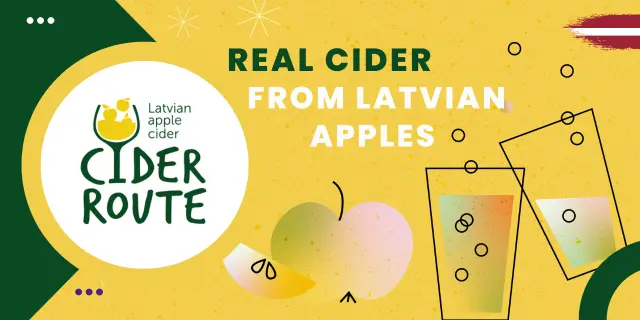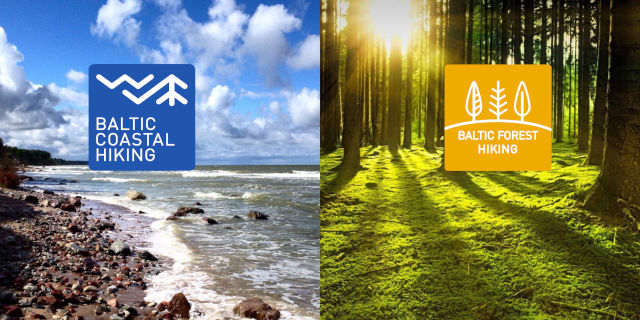Naturobjekte in Litauen
Was ist das Besondere an der Natur in Litauen?
Die Kurische Nehrung - ein sandiger, wüstenartiger Landstrich zwischen dem Ostseesee und dem Kurischen Einlass, die hügeligen Landschaften der Region Samogitia, die blauen Spiegellabyrinthe der Seen in der Region Aukštaitija, die Kiefernwälder in der Region Dzukija, Die Kurven des Nemuna-Flusstals und die vielen regionalen Naturparks, die nicht nur zum Schutz der Natur, sondern auch zur Erholung und zum Interesse der Menschen geschaffen wurden - dies sind die Naturwerte, die Gäste Litauens anziehen.
Handle verantwortungsbewusst - folge dem Grünen Rat!
| Überblick | Details |
|---|---|
|
Litauen
Insel RusnėEine Insel in der Nemunas-Deltamündung. Ethnographisches Museum, Uostadvaris-Leuchtturm, Vogelbeobachtungsturm. |
|
|
Litauen
Parniddene DüneIn der Umgebung von der 52 m hohen Parniddenen Düne sind die im 18. Jh. bei einem Holzeinschlag entstandene Wanderdünen zu sehen! Aussichtsplatz. |
|
|
Litauen
Sarneles (Zviedru) pilskalns (Sarnelės (Svedų) piliakalnis)Viens no iespaidīgākajiem nacionālā parka pilskalniem, kura piekājē atradusies senpilsēta. Arheoloģisko izrakumu gaitā te atrastas kuršu senlietas. Tiesa, mežs un biezais augājs traucē uztvert šī nozīmīgā arheoloģijas pieminekļa patiesos apjomus un formu. Uz pilskalnu vasarās ved izpļauta taka. Ja esat Žemaišu Kalvarijas pusē un atliek brīvs brīdis, tad savā maršrutā var iekļaut arī šo apskates objektu. |
|
|
Litauen
Putnu verosanas tornisReškutenu (Reškutėnai) ciema apkārtnē ir atjaunots neliels mitrājs, kura malā uzcelts putnu vērošanas tornis. Ja paveicas, pavasaros te var dzirdēt vai redzēt tādas retas un aizsargājamas putnu sugas kā ķikutu Gallinago media, ormanīti Porzana porzana, melnkakla dūkuri Podiceps nigricollis, griezi Crex crex u.c. Ciema ainava īpaši pievilcīga ir pieneņu un ābeļu ziedēšanas laikā. No putnu vērošanas torņa var redzēt vietas, kur akmens laikmetā dzīvojuši cilvēki. Blakus esošajā purvainajā pļavā bijis ezera līcis, kur tika būvēti ciemati līdzīgi kā Āraišu ezerpils gadījumā. |
|
|
Litauen
Burgberg SeredziausEine der malerischischen Burgberge am Fluss Nemunas mit schöner Sicht aufs Flusstal. In 13 – 14 Jh. befand sich hier eine militäre Festung, die nicht erhalten ist. |
|
|
Litauen
SCHLOSSPARK RIETAVASDer Park Rietavas war der größte Landschaftspark in Litauen. Angelegt wurde er 1848-1855 in einem natürlichen, ausgedünnten Wald; 1904-1905 erfolgte eine Rekonstruktion. Der Park ist gemischt geplant. Den Großteil des Parks nehmen einheimische Bäume und Sträucher ein, jedoch mit zahlreichen Beimengungen fremdländischer Arten. Aus jener Zeit sind einige Alleen und Fragmente von Zäunen erhalten, das Weiße und das Rote Tor, das Wächterhäuschen an den Toren. Der Park enthält ein komplexes System an Gewässern, bestehend aus einigen Teichen einer Schleife des Flusses Jura und Altarmen, die eine Insel bilden. |
|
|
Litauen
Ginucu pilskalns (Ginucių piliakalnis)Viens no lielākajiem Augštaitijas pilskalniem, kas 2011. g. pēc vērienīgiem rekonstrukcijas darbiem ir izzināms jaunā kvalitātē - gan no infrastruktūras, gan arī ainaviskā viedokļa, jo iepriekš biezais pamežs (tagad retināts) traucēja uztvert iespaidīgo objektu. Arī no pilskalna plakuma paveras labs skats uz diviem blakus esošajiem ezeriem. Tā virsotnē apskatāms piemiņas akmens, kas vēsta par pirmā Lietuvas valsts prezidenta Antana Smetona (Antanas Smetona) apmeklējumu 1934. g. viņa 60 gadu jubilejā. Pilskalns it ticis apdzīvots jau I tūkstošgadē pirms Kristus. Uzskata, ka 14. – 15. gs. te atradusies hronikās aprakstītā Linkmenu pils. Jaunizveidotā taka pilskalnu savieno ar vēl vienu populāru apskates objektu – Ladakalni. |
|
|
Litauen
Regionalpark der Nemunas-BögenEine schöne malerische Flussstrecke zwischen Alytus und Pakuoni, wo der Fluss mehrere breite Mäanderkrümmungen mit bis zu 40 m hohen Mörenenabdeckungen macht (Balbieriškio-Abdeckung u.a.). |
|
|
Litauen
BrändeNahe der Beerkopfdüne ist im Frühling 2006 „ein Brand der Jahrhunderte” gewessen. Es wurde der hundert Jahre alte Wald in der Fläsche von 235h ausgebrannt. Ein Pfad mit Holzbelag. |
|
|
Litauen
Seires dabas taka (Seirės gamtos takas)Četrus kilometrus garā lokveida un marķētā dabas taka meklējama Plateļu pilsētiņas ziemeļaustrumu daļā. Tā ved pa dažādiem biotopiem – mežu, purvu, ezera malu, atklājot dažādas ainavas un tajās mītošās augu, putnu un dzīvnieku sugas. Šī ir interesantākā un ainaviskākā no Žemaitijas nacionālā parka takām. |
|
|
Litauen
Plokstines izzinas taka (Plokstinės pazintinis takas)Ja apskatīta kodolraķešu bāze, tad var iziet 3,2 km garo Ploštines izziņas taku, kas sākas turpat netālu. Taka ved cauri dažādiem mežu tipiem, iepazīstinot ar sikspārņu būrīšiem (cilvēka radītas sikspārņu dzīves vietas), apkaimes augiem un putniem, kā arī aizsargājamu dabas pieminekli – Pileļu avotu (Pilelio šaltinis). |
|
|
Litauen
SCHLOSSPARK PAKRUOJISDer Landschaftspark Pakruojis wurde 1850-1860 angelegt und hat seine Struktur bis heute bewahrt. Von der einen Seite bildet die aufgestaute Kruoja eine natürliche Begrenzung für den Park, auf der anderen Seite wurde eine Mauer aus Feldsteinen errichtet. Nach der englischen Mode jener Zeit hatte die natürliche Situation Vorrang bei der Anlage eines Parks. Daneben die Imitation von Natürlichkeit. Im Park wachsen Bäume aus etwa 26 Taxa, darunter auch seltene Exemplare aus aller Herren Länder, die vor Jahrhunderten gepflanzt wurden. |
|
|
Litauen
Ula (Ula) un Merke (Merkys)Ūla ir viena no skaistākajām un likumsakarīgi – arī populārākajām Lietuvas ūdenstūristu upēm. Tās galvenā pievilcība ir skaistā ainava ar augstajiem upes krastiem, kuros slejas iespaidīgas smilšu kraujas līdzīgi kā Irbes krastos Latvijā. Laivošanu var sākt no Mančagires (Mančiagirė) vai Zervinos ciemiem un turpināt līdz Ūlas ietekai Merķē un tālāk pa Merķi līdz pat Merķinei un Nemunai. Ūla nav plata, taču posmā no Zervinos ciema tajā nav neviena koku aizgāzuma vai cita šķēršļa, kuram laiva būtu jānes apkārt. Ašā straume, asie līkumi, dzidrais ūdens un tajā redzamā zemūdens pasaule rada patiesi patīkamu sajūtu! Upes krastos atrodas gan publiskas (apsaimnieko Lietuvas valsts meži), gan privātas ūdenstūristu apmetnes un atpūtas vietas. Šī ir vienīgā Baltijas upe, kur ūdenstūristiem ir jāpērk licence. Ūlas krastos atrodas divi interesanti apskates objekti – Ūlas atsegums (Ūlos atodanga) un spēcīgs avots – Ūlas acs (Ūlos akis). Savukārt, Merķe jau ir jau krietni platāka upe, taču ar acīm redzamu straumi un dažviet pat jaukām straujtecēm. Kaut arī Merķes krasti ir mazapdzīvoti, tajos atradīsim piemērotas nakšņošanas vietas. Pa Ūlu un Merķi no Zervinos līdz Merķinei sanāk „mierīgs” pusotras - divas dienas ilgs brauciens. |
|
|
Litauen
SCHLOSSPARK RENAVASDer Park Renavas (begründet im 19. Jh.) ist einer der Parks zum Repräsentieren, der jedoch seine ursprüngliche, naturnahe Form gut erhalten hat. In dem Parkfragment unterhalb des Schlosses sind bis heute viele exotische Bäume erhalten. Im nördlichen Teil des Parks und im Waldpark herrschen Ahorn, Linde, Esche, Fichte, Eiche u.a. vor. Prunkstück des Parks ist die mächtigste Fichte in Litauen mit einem Durchmesser von 1,2 Meter, ebenso eine Linde, aus deren umgefallenen ursprünglichen Stamm sechs Äste zu neuen, unabhängigen Stämmen erwachsen sind. Der Eingang zum Park ist als Pergola mit Kletterpflanzen ausgeführt. |
|
|
Litauen
Regionalpark LabanorasEins der bewaldeten und seenartigen (ung. 285 Seen) Gebiete Litauens mit vielfältigen Erholungsmöglichkeiten, einbezogen aktive Erholung. |
|
|
Litauen
BOTANISCHER PARK PALANGA (BIRUTĖ-PARK)Der botanische Park Palanga umgibt das Bernsteinmuseum in Palanga. Er ist einer der schönsten, reichhaltigsten und am besten gepflegten Parks in Litauen. Begründet wurde er aus dem Birutė gewidmeten einstigen Bannwald und war daher lange Zeit im Volksmund als Birutė-Park bekannt. Er hat ein Areal von 101,3 ha. Der mit Talent entworfene Park zeichnet sich durch große landschaftliche Vielfalt aus, mit meisterhaft gewundenen Pfaden, Blumenrabatten auf den Plätzen, 2 Teichen und Elementen der Kleinarchitektur. |
|
|
Litauen
The Stelmuzės oak treeThis is the thickest English oak (Quercus robur) in Lithuania, with a circumference of 9.4 m (as opposed to the Kaive oak in Latvia, which has a circumference of 10.18 m).
|
|
|
Litauen
BOTANISCHER GARTEN TRAUPISDer Grundstein für den einzigen botanischen Garten einer Schule in Litauen wurde 1989 an der Schule in Traupis gelegt. Alle Pflanzen in der Kollektion (insgesamt wachsen im Botanischen Garten Traupis über 8000 Arten, Sorten und Formen von Pflanzen) wurden von nur einer Person gesammelt, von Sigutis Obelevičius. |
|
|
Litauen
BOTANISCHER GARTEN DER VYTAUTAS-MAGNUS-UNIVERSITÄT IN KAUNASDer Botanische Garten wurde etwa 1923 begründet, als Zentrum der Botanik in Litauen. Der Garten hat eine Fläche von über 60 ha, wovon etwa 30 ha von der öffentlich zugänglichen Ausstellung eingenommen werden. |
|
|
Litauen
Hügel LadakalnisVermutlich ein heidnischer Hügel. Schöner Blick auf die 6 Seenlandschaften. Ein Symbol vom Nationalpark. |
|
|
Litauen
ÄLTESTER LITAUISCHER APFELBAUMDer älteste Apfelbaum in Litauen ist als botanisches Erbe geschützt. Dabei handelt es sich um einen Holzapfel, den einzigen geschützten Apfelbaum in Litauen. |
|
|
Litauen
ARBORETUM DUBRAVAMit der Anlage des Arboretums Dubrava begann man 1958 in der Waldforschungsstation Dubrava in dem bei Kaunas gelegenen Dorf Vaišvydava. Hier werden Gehölze gesammelt, aufbewahrt und gezeigt, einheimische und eingeführte, gleich ob diese aus wissenschaftlichem, ästhetischem oder wirtschaftlichem Blickwinkel bedeutsam sind. Das Arboretum nimmt über 50 ha ein. Hier wachsen mehr als 800 Arten, Unterarten, Formen und Sorten von Gehölzen. Einige der Abteilungen des Arboretums (Nadelhölzer und Heidekrautartige, die Quarantäne-Baumschule für Neophyten und die Sammlung seltener Bäume und Sträucher) können nur nach vorheriger Anmeldung besucht werden. |
|
|
Litauen
The Salantai Regional ParkThe terrain in this territory was created during the Ice Age. There are the ancient river valleys of the Minija, Salantas and Erla rivers, along with groups of rocks.
|
|
|
Litauen
SCHLOSSPARK ZAGARĖDer Schlosspark Žagarė ist einer der prunkvollsten und aus architektonischer Sicht einer der interessantesten in Litauen. Der Park wurde 1898-1900 rekonstruiert und dabei nach einem Entwurf des berühmten Gartenarchitekten Georg Kuphaldt erweitert. Im Park wurden mehr als 200 Arten Pflanzen angepflanzt. Davon wachsen über 100 auch heute noch. Eine Vielzahl an Wegen und Pfaden sind im Park erhalten, auf denen man die Größe und Schönheit des Parks eindrücklich empfinden kann. In dem Park gibt es einen dendrologischen Lehrpfad, wo 15 seltenere Baumarten markiert und beschrieben sind. |
|
|
Litauen
Negelsches Naturreservat (Naglių rezervatas)Die Dünen nördlich Pervalka über dem ehemaligen Dorf Negeln. Eine 9 km lange Strecke mit den wüstenartigen Landschaften. Stegpfade. |
|
|
Litauen
The Asveja Regional ParkThis park was established to protect Lithuania’s longest lake, Lake Asveja (> 20 km). The lake is in a sub-glacial valley carved out by ice during the Ice Age, and it actually resembles a wide and curvy river.
|
|
|
Litauen
SCHLOSSPARK JONISKĖLISDer Park des Gutes Joniškėlis wurde in der zweiten Hälfte des 18. Jh. im Landschaftstyp angelegt. Zu Beginn des 19. Jh. erfolgte ein Umbau mit Erweiterung. Durch den Park fließt die Mažupė. Vom Park führt entlang des Fußwegs eine Lindenallee bis zum Städtchen. Vor dem Herrenhaus befindet sich ein großer Platz. Im Park wachsen über 20 Arten einheimischer Bäume und Sträucher und weitere 30 Arten eingeführter Gehölze. Beeindruckend und wertvoll sind zwei Fichten mit schlangenförmigen Ästen und eine Fichte in Nestform. Zudem gibt es eine stattliche Gruppe abendländischer Lebensbäume ('Ellwangeriana'), eine Stieleiche (f. laciniata), einen zweistämmigen Silberahorn, einen Butternussbaum. Im Park gibt es 3 Teiche. |
|
|
Litauen
MUSEUM BALTISCHER KRÄUTER2014 wurde unter Vermittlung des Botanischen Gartens der Universität Šiauliai ein Museum mit den genetischen Ressourcen der baltischen Kräuter angelegt. Den Besucher erwartet ein 85 m langes und 40 m breites Gelände mit einer Fläche von 0,34 ha. |
|
|
Litauen
Nationalpark DzukijaGegründet für den Schütz des von Wäldern reichtesten Gebietes Lituens und der mit der Bewirtschaftung des Gebietes verbundenen Volkstraditionen. |
|
